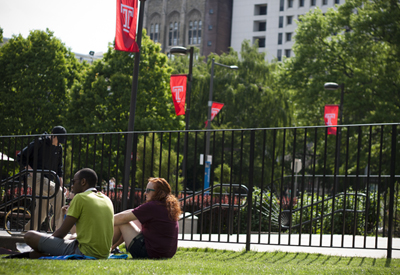When Gov. Tom Corbett signed Pennsylvania’s budget, he put to rest months of debates on where and how the commonwealth’s money should be spent for the 2012 fiscal year. A sliver of that money was dedicated to Temple.
But while the university came out of this reapportioning period with a smaller appropriations reduction than originally proposed, it was not completely unscathed – an event that both students and employees will be reminded of throughout the academic year.
RAISING PRICE TAGS & DECREASING OPERATIONS
The four state-related universities’ state subsidies were reduced by 19 percent, landing Temple’s appropriations at $139.9 million – down from the $172.7 million it received this year.
As a result of this cut, base tuition prices were determined to rise by $1,172 and $1,170, for in-state and out-of-state students, respectively.
Corbett originally proposed a 50 percent cut to Temple’s funding.
“[This] reduction is still a considerable reduction in support from the state of Pennsylvania, so we had to make that up somewhere,” Assistant Vice President of University Communications Ray Betzner said. “Had it been a 50 percent reduction, you would have seen a much higher tuition increase.”
For the academic year, the base tuition rate for in-state students will be assessed at $13,006, while it will stand at $22,832 for out-of-state students.

Betzner said students won’t face the burden alone.
The university has approved a reduction of $36 million in its operating budget for the year, Betzner said. Cuts outlined in the university’s budget show a decrease in budgets of individual schools and offices across many areas of the university.
The subsidy from the university to the department of intercollegiate athletics, for instance, is slated to decrease $960,000, from roughly $9.6 million to about $8.4 million, according to the university’s approved budget for the 2012 fiscal year.
However, the budget also suggests the revenues for the athletics department will rise $2.9 million, which would leave the department in the green.
Betzner said the university will look to other places to make money, as well.
“We’re going to work really hard to try to raise as much money as we possibly can from alumni and others,” Betzner said. “But that’s not guaranteed dollars.”
While increases in tuition costs are nearly the same for in-state and out-of-state students, the gap between the two prices will likely narrow if the declining trend of commonwealth support to Temple continues.
“As the subsidy the state pays us goes down, the difference between what an in-state and out-of-state student [pays] gets narrower,” Betzner said, noting that the subsidy is used to keep college costs low for taxpaying residents of Pennsylvania.
Betzner said the university can not treat the declining support as a “one-year event.”
“That’s just not reasonable if you take a look at what’s happened historically,” Betzner added. “We need to recognize this is a trend line and it’s not going to stop at the end of this year.”
To help combat rising tuition prices, Betzner said, the university increased its financial aid by $6.8 million, to $81.8 million.
“The goal there, again, is that, for talented students with limited means, a Temple education is still within their means,” Betzner said.
FILLING THE VOID
Although students’ wallets will feel the budget cut, the impact of the state’s decreasing support will be evident in other areas of the university as well.
In April, an announcement outlined President Ann Weaver Hart’s actions while the cuts in appropriations were still undecided. These actions included salary freezes for non-union professionals, a university hiring freeze with certain exceptions, a restriction on travel and a review to possibly consolidate administrative positions.
Betzner said that these actions are still in effect and that the review for administrative consolidation is still a work in progress.
Hart also delayed searches for new deans for five areas of the university, Betzner said, but will make specific decisions on hiring new deans on a case by case basis, with the assistance of the provost.
Betzner said that, as per the request of Hart and her cabinet, the deans of each school were given certain goals to meet by the end of the year – including making decisions pertaining to staffing positions.
“While tuition is certainly important and there’s no doubt it has an impact on people’s lives, there are going to be other impacts from this budget,” Betzner said. “There are positions that are not going to be filled, there are going to be positions that are going to be eliminated, there will be contracts that won’t be renewed.”
Angelo Fichera can be reached at afichera@temple.edu.


Be the first to comment